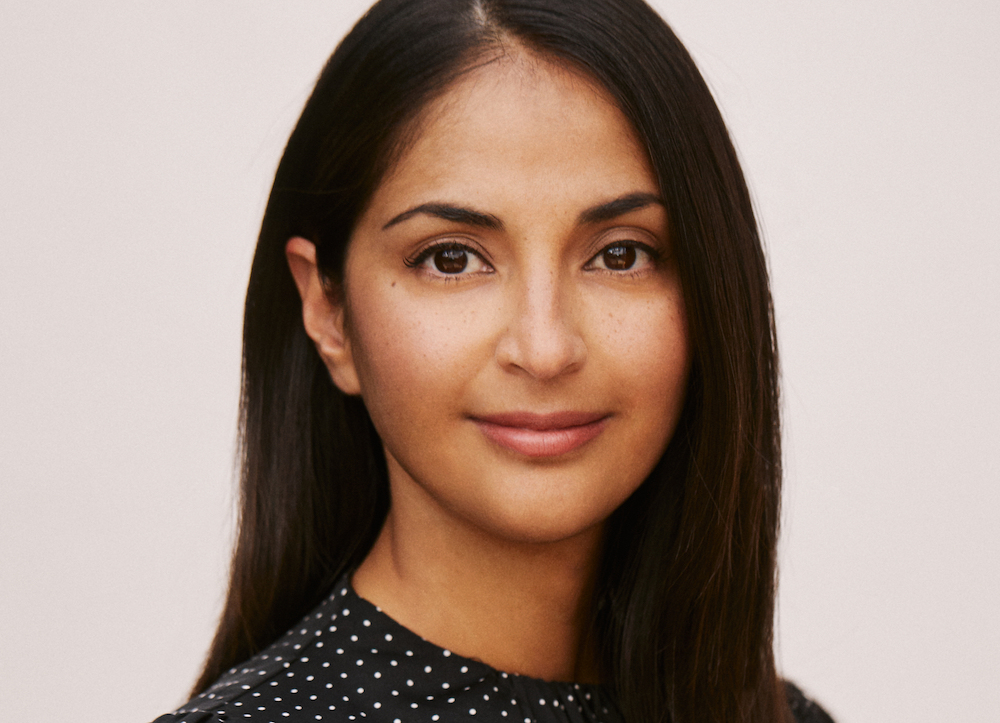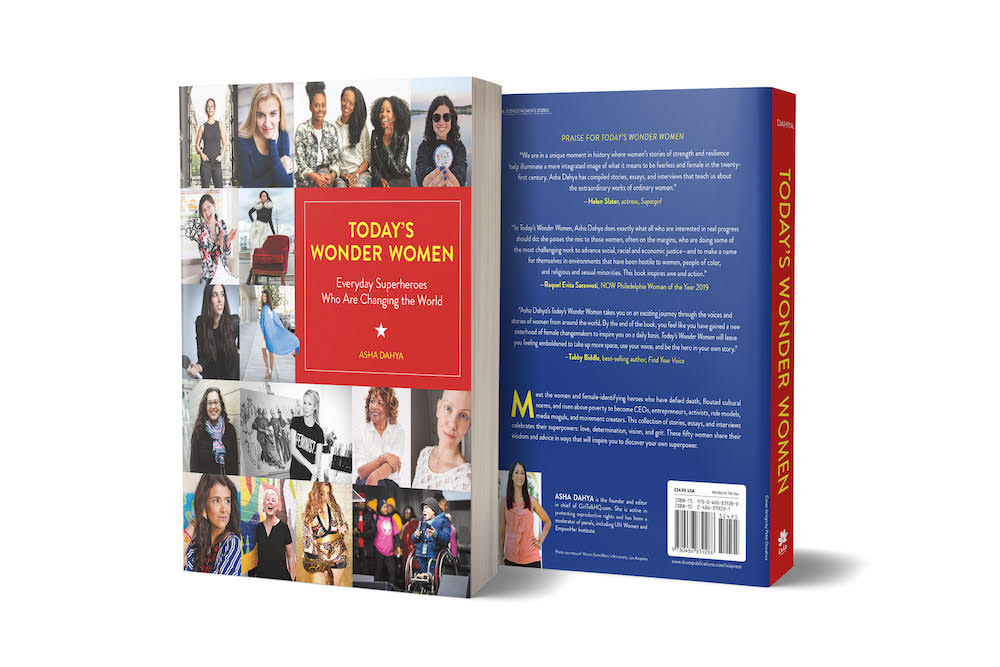
Asha Dahya Inspires With Her New Book ‘Today’s Wonder Women’
September 2, 2020
Rana Good is the founder of Naïra NYC. A writer for publications such as Forbes, Travel + Leisure, Coveteur, Mens Journal and others, she created her own platform celebrating women of color.
Asha Dahya is the founder of GirlTalkHQ, a “global headquarters of female empowerment stories” and recently published her first book Today’s Wonder Women. The book, which is available on Amazon and Audible, features 50 badass women who have accomplished incredible feats in their communities. We spoke to Dahya about what motivated her to write the book and how it delivers hope in these challenging times.
What made you decide to write ‘Today’s Wonder Women’?
Asha Dahya: I had been publishing numerous interviews and profiles on amazing women on my blog GirlTalkHQ for a number of years and wanted to find a way to reach new audiences and share these powerful stories in a bigger way. I created this blog platform to share the stories and lives of everyday women doing inspiring things and it just made sense to choose 50 and package them together in a book. I guess another reason was to inspire readers about the everyday heroes that exist all around us, in the hope it would motivate them to know they have the power to change the world by reading these stories.
Who are some of the women who stood out to you the most in the book? Why?
It’s so hard to pick just a few as I love them each for different reasons. But here are a couple I can share here. The first is Fraidy Reiss, the founder of an organization called Unchained At Last. Fraidy is a forced marriage survivor and hers is the only organization tackling child and forced marriage in the U.S. (yes, you read that right this is an American problem!). Her work and story stood out to me because when we think of child and forced marriage, we think of “other” countries and someone else’s problem. But it is actually ours. According to the org’s research, between 2000 and 2010 there were approximately a quarter of a million child marriages registered across the country. They commonly happen because parents of a pregnant teen don’t want the shame of her having a child out of wedlock or for religious reasons. What is most striking is how many loopholes there are in state legislatures, allowing parents and judges to decide that it’s okay for a teen to get married. To date, it’s still legal in 46 states, and Delaware, New Jersey, Pennsylvania, and Minnesota only completely outlawed child marriage in recent years thanks to the advocacy and lobbying of Unchained at Last and their allies.
The second woman is Ana Flores, founder of We All Grow Latina, the largest organization of digital Latina influencers in the United States. She also founded the We All Grow Summit, which Forbes has named as one of the top 12 summits every creative should attend. She’s a successful businesswoman, a mom to a daughter, and someone who understands the ups and downs of being an entrepreneur. She put her heart and soul and savings into this venture, and in the lead up to her first Summit, almost declared bankruptcy. For Ana, her story isn’t just the successful parts, it is about how she has hit rock bottom and learned so much from her failures. Determined to tap into the economic potential of Latinas, she is showing the business world that you cannot afford to ignore minority women if you want to be successful these days.

In what ways does your book deliver hope?
I think it shows that we don’t have to wait for someone out there to come and give us permission to do what we love and are passionate about. That we don’t have to be super-wealthy, a celebrity, or look a certain way to change the world. History is full of examples of women who doubted themselves but persevered anyway. The 50 women in my book, I believe, are contemporary examples of what it is like to forge new pathways. I also love the underlying message that our success isn’t just about us, it is about who we impact and empower along the way that truly makes our efforts worthwhile.
Is there a common trait or talent you see in trailblazing women?
These are women who saw a problem or something missing in their world and didn’t wait around for someone else to step in and find the answer. They have all been through some big and difficult experiences and chose to use that for the betterment of others. I think all of the stories speak to the power of women throughout history who have used their talents and time to not just benefit themselves, but others around them. It reminds me of the quote “we are the ones we have been waiting for” written by South African poet June Jorden during the apartheid. We get sold this idea of a “prince charming” or a “knight in shining armor” either figurative or literal, as women. The notion that someone else out there is going to be our hero or save the day. But why not us? If not us, then who?
The last time I interviewed you was right after the last election. What’s your perspective on women’s rights in the U.S. since?
That’s right! In a nutshell, it has gotten worse, much worse. We can see this from laws such as those in Georgia and Alabama in 2019 which sought to criminalize all abortions, (no exceptions for rape or incest in some cases) showing how emboldened the conservative right is in explicitly trying to overturn Roe v. Wade. Even Texas tried to introduce a bill that would seek the death penalty for abortion, but it didn’t pass through their legislature. Many of the anti-abortion and anti-reproductive autonomy folks are testing out what they “bought and paid for” with Trump and his Supreme Court picks in Gorsuch and Kavanaugh, by introducing laws that will be challenged in court and potentially make their way up to the Supreme Court. But as we saw in June Medical Services v. Russo this term, they did not get their wish. However, a different Supreme Court case, which didn’t get as much fanfare, allowed the Trump administration to gut part of the Affordable Care Act. Specifically, the part which mandates coverage for birth control. The court allowed the “religious freedom” excuse to be used to discriminate against people, and we are going to see this excuse be used a lot more if Trump wins again. We have to be vigilant. We should refuse to live in a country that allows freedom for some, and restricted and oppressive opportunities for others. It’s not just about who we elect as president, but our local and state leaders, our local judges, which movements we support, where we spend our money, and which voices we amplify.
What’s at stake in the next election?
There’s a lot on the table. I saw a political writer say something to the effect that it is not a choice between Republican and Democrat, but democracy and fascism. I think that sums it up. We could list all the ways in which the Trump admin and the GOP have successfully chipped away at freedoms over the past four years (trans rights, reproductive rights, immigrant rights, healthcare access, voter suppression), but when it comes down to it, it really is a question of whether we want to elect leaders that believe in working to ensure freedoms and rights for all, versus elevating a particular philosophy, ideology, or religion of a few to the detriment of the many. If we can focus on that larger picture, we can hopefully better work together to build systems that are inclusive.
How have you grown as a content creator? Do you have any advice for budding content creators?
For me, especially during COVID, I have learned to reevaluate what really matters, and better value my time. Having two young kids now and balancing book promotion with my blog and other TV projects in the works, it means I am far more intentional with the content I publish and selective of the stories I choose.
My advice would be to be authentic, find your niche, and don’t play the comparison game. And if you start something and decide it wasn’t the right fit or it didn’t work out, that’s okay! That’s not failure, that’s growth.
And lastly, I would say ask yourself what your message is. What do you want to say? Keep going back to your core reason, your “why” and that will help you stay on the path you were meant to be on.